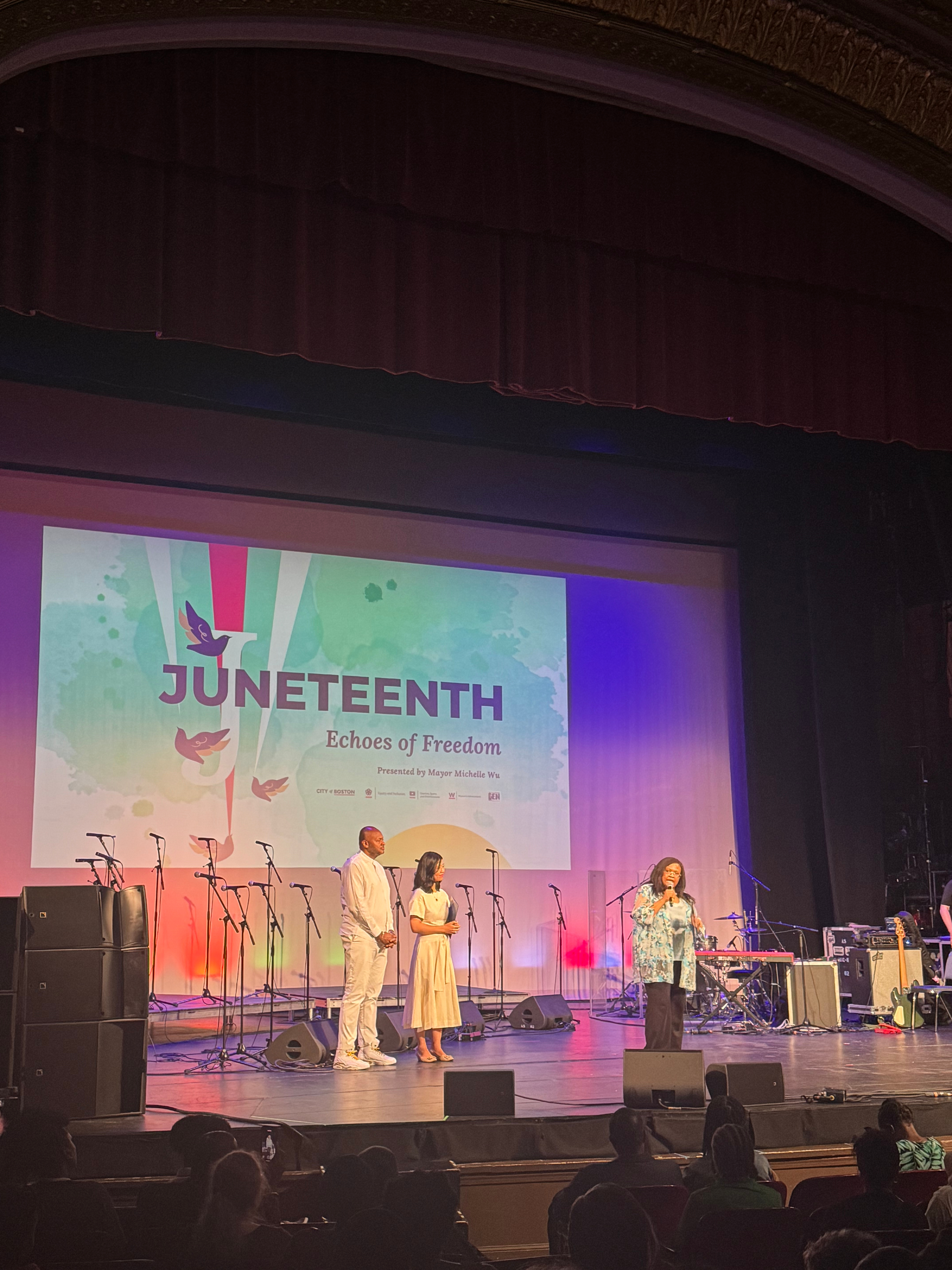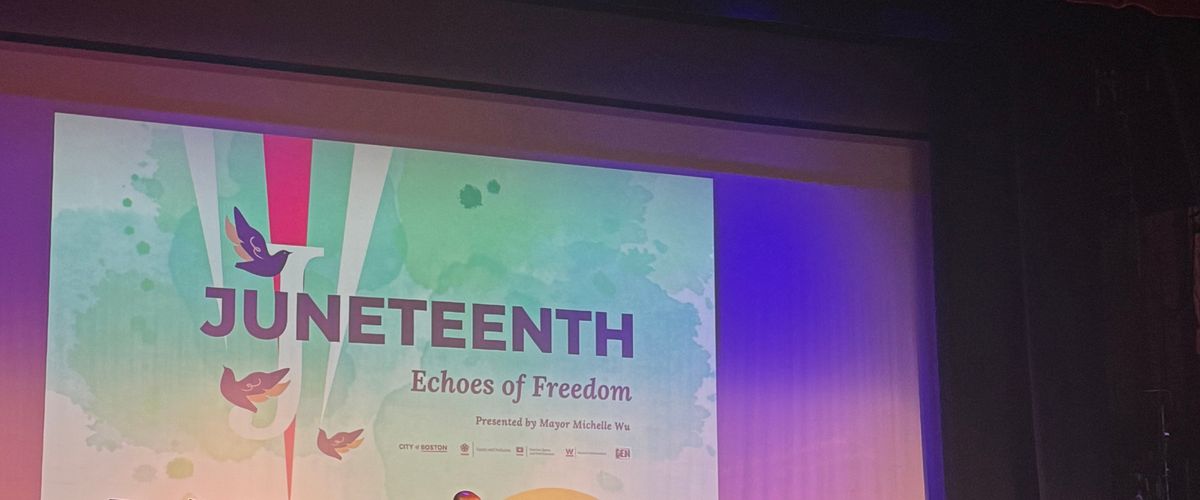This past summer, I had the privilege of serving as a Racial Justice fellow with the City of Boston’s Equity and Inclusion Cabinet. My interest in this internship stemmed from some of my past experiences working in City Hall and with a variety of elected officials in Massachusetts, as my most interesting and fulfilling work in those spaces was research projects or working on community events aimed at tackling inequities in Boston and expanding resources to residents who have historically lacked them. Thus, the opportunity to build on my past experiences and spend a summer solely dedicated to work connected to achieving a more equitable and inclusive Boston was exciting.
I am truly grateful to the Racial Justice team and the Equity and Inclusion office for creating such a welcoming environment and making this summer such a meaningful and positive experience. Working with Susan McCollin, Special Projects Administrator for the E&I cabinet; Kenneth Moales, Policy Research Analyst and Project Coordinator for E&I; and Lori Nelson, Senior Advisor for Racial Justice, was without question the highlight of my summer. They are not only deeply dedicated public servants but also genuinely kind and supportive people, which made my experience all the more impactful.
This summer, my primary task was to rebrand an initiative called Dialogue to Action (D2A), which had been proposed and piloted in previous years but never fully launched or implemented in the community. The initiative focuses on creating space for residents to discuss equity, belonging, and the city’s legacy of racism and exclusion within the broader context of systemic injustices nationwide. The rebrand was designed to fit the current moment, one marked by the growing erasure of marginalized voices and renewed concerns about equity and belonging.

Dr. Michael Curry and Dr. Noelle Trent receiving an award presented by Mayor Michelle Wu.
These dialogues, which will occur across multiple sessions and be repeated across neighborhoods in Boston, will be guided by a trained facilitator who will work to ensure that participants feel heard and respected. In addition to sessions designed to unpack experiences of racism and envision pathways to equity in the city, there are also educational components aimed at equipping residents with information about local elections, how to contact their elected officials, and how city and state governance structures function. D2A is designed to be administered in four phases, each with two different primary focuses and distinct sets of session topics and goals. The first two, titled “Acknowledgment and Dialogue” and “Education and Information,” will be replicated across several neighborhoods in Boston. Following these sessions, the facilitators will meet to discuss their findings and compile a report to be submitted to the Equity and Inclusion cabinet, which will describe the communities’ needs, concerns, and any recommendations that arose from the community dialogues. Resident participants and facilitators alike will also be invited to participate in any anonymous survey, which will also be used to inform future iterations of D2A.
With the theme of Dialogue to Action being “From Erasure to Empowerment,” it felt necessary to include a civic education component because, without access to tools for advocacy, people can feel voiceless and as though their elected officials do not represent them. In creating some of the educational materials, I gained a deeper understanding of how inaccessible government structures can be. This is especially true for people who never learned civics in school, those who studied it long ago and may have forgotten, individuals who are not fluent in English, and members of immigrant communities, among many others. There is no single place where Boston residents can see the parallels and differences between city, state, and federal governance, and obtain the contact information for all their elected officials. For people without internet access or an understanding of where to get information, the structure of government is a tricky puzzle to unravel. My desire to create a space where residents could work through that puzzle together using carefully designed materials—and leave feeling more informed and heard—guided the direction I took with the D2A rebrand.
The experience of rebranding D2A from the ground up was so impactful to my own approach to community-facing work because it served as a reminder of how important it is to consider all aspects of accessibility in terms of how we’ll advertise the initiative, as well as the readability and simplicity of educational materials. D2A was not designed for any singular type of Boston resident, and as such it was vital that the activities planned and discussion questions were ones that people of all ages could interact with meaningfully.
My work on the project and within the Equity and Inclusion Office also reaffirmed my passion for civic education and community-facing work, because I see it as an avenue to equip people with the tools they need to make the changes they want to see in their communities and to hold local institutions accountable. Having previously worked for elected officials at the city and state levels in Boston, I grew to love constituent services and the one-on-one contact with residents who reached out with a wide range of issues. This summer, I was able to apply that experience to a different kind of community-facing work.

Members of the Howard Gospel Choir with Mayor Michelle Wu on June 18th
While I spent most of my summer working on Dialogue to Action, I was also fortunate enough to attend some events both in City Hall and across the city. In mid-June, the Equity and Inclusion cabinet led and collaborated on a series of Juneteenth events, including but not limited to a flag raising at City Hall and the Echoes of Freedom Event at the Strand Theater. The latter was an inspiring night of music and artistry that featured the Howard Gospel Choir and performances by local creatives from Boston. Aiding behind the scenes of such an amazing event was a cool experience, as I got to meet so many community leaders and city officials outside of the people I normally interacted with within the Equity and Inclusion Cabinet. While the Echoes of Freedom event was the most fun event I attended, the most eye-opening and powerful events I attended were a part of Boston’s Live Long and Well Campaign, which the Boston Public Health Commission leads. The campaign originated out of a 2020 executive order from former Mayor Marty Walsh that declared racism a public health crisis in the City of Boston and aims to improve life expectancy for residents across the city and reduce racial disparities in health care.

Nayeli at the Live Long and Well press release on July 28th
At the press release announcing the grantees selected for the Live Long and Well Catalyst Program, I was fortunate to hear from Mayor Wu, members of the Boston Public Health Commission, Atrius Health Equity Foundation, and the Boston Community Health Collaborative. In the press release, they outlined their multi-pronged approach to addressing Boston’s health care needs and explained how the grant awards will support programs that target the social determinants of health. As a lifelong Boston resident who has seen firsthand the differences in health care access across neighborhood lines, I found it powerful to see the City taking decisive steps to address disproportionate resource access and other social determinants of health tied to geography, race, gender, and age.
This summer was one of the most rewarding of my undergraduate career, as I began to see a future in government work take shape and discovered new ways to channel my passion for civic engagement and my commitment to building a more equitable and inclusive city. With my graduation from BU approaching in May, I hope to remain in Boston for a gap year working in a similar role before pursuing a joint degree in Public Policy and Law.
